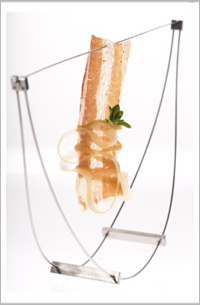By Steve Rhodes
A weekly (usually) look at the magazines laying around Beachwood HQ.
Antifood
I’m sure the story of Grant Achatz, the internationally renown chef of Alinea in Lincoln Park who was struck with tongue cancer a few years ago, isn’t new to many people in Chicago. But frankly, I never really paid attention. Perhaps that’s why I found the New Yorker’s account this week so fascinating, though I think even those who already know the story will enjoy this piece.
Besides the obviously tragic irony of a chef losing his sense of taste, this is a story about the sense of taste itself, as well as the school of molecular gastronomists he belongs to that turns cooking into a science fair project for erstwhile art students.
 I find this kind of cheffery and consumption decadent and even immoral – there are no limits to the luxuries we can gloriously bathe ourselves in as we refine our tastes evermore while huge swaths of the world go hungry – but read for yourself and see if you are offended somehow by dehydrated bacon wrapped in apple leather swinging from a metal contraption.
I find this kind of cheffery and consumption decadent and even immoral – there are no limits to the luxuries we can gloriously bathe ourselves in as we refine our tastes evermore while huge swaths of the world go hungry – but read for yourself and see if you are offended somehow by dehydrated bacon wrapped in apple leather swinging from a metal contraption.
“The meal was almost comically elaborate,” D.T. Max writes of his visit to Alinea in March, “involving twenty-four courses and costing three hundred an seventy-five dollars, with wine. The food starts off at the savory end of the spectrum, and slowly turns sweeter, concluding with coffee, in the form of crystallized candy. Most items could be eaten in a bite or two, but the procession took four and a half hours. I had liquefied caramel popcorn in a shot glass, and a bean dish that came on a tray with a pillow full of nutmeg-scented air. The plate of beans was placed atop the pillow, forcing the aroma out. I sampled a “honey bush tea foam cascading over vanilla-scented brioche pudding,” in the words of the young man who brought it. There was also a dish centering on a cranberry that had been pureed and then re-formed into its original shape. The berry was then prepared on a device called the Antigriddle, which Achatz had helped design. The Antigriddle froze the bottom of the berry but left the top soft.
“A few dishes were merely fanciful; most were fanciful and delicious. My favorite was called Hot Potato, Cold Potato. A ball of potato, simmered in clarified butter and covered by a black truffle, had been skewered on a steel pin, along with a cube of Parmesan, butter, and chives. I slid these items off the needle, allowing them to fall into a bowl of cold potato soup. Then, doing as the server instructed, I tipped my head back and downed a soup that was two temperatures at once.”
The story also says something about Chicago and, perhaps, its bumbled rush to be seen as sophisticated and worthy.
“Chicago prides itself on being a city with more daring restaurants than Manhattan – the city also has Moto, an Asian-inflected outpost of molecular gastronomy – and the home-town response was unequivocal. The Tribune exalted the very dishes that the Times suggested were contrived or showy, declaring the P. B. & J. opener ‘comfort food fit for the Museum of Contemporary Art.'”
Which suggests the locals didn’t have the guts to say the whole thing is ridiculous for fear of coming off like hayseeds. But whatever. (To be fair, Gourmet did name Alinea the best restaurant in America in 1997 2006.)
At any rate, the tale of Achatz’s cancer is the primary one; at one point he was faced with having his tongue cut out or dying. I won’t give away how it turned out.
Image Disorder
 Speaking of immoral . . . as long as you’re reading the Achatz story, stick around for “Pixel Perfect“, the tale of Pascal Dangin, a master digital photo retoucher whose work has surely contributed to the body-image woes and obsessions of millions of women – and the men who perceive them – worldwide.
Speaking of immoral . . . as long as you’re reading the Achatz story, stick around for “Pixel Perfect“, the tale of Pascal Dangin, a master digital photo retoucher whose work has surely contributed to the body-image woes and obsessions of millions of women – and the men who perceive them – worldwide.
The story breaks some news: “I mentioned the Dove ad campaign that proudly featured lumpier-than-usual ‘real women’ in their undergarments,” Lauren Collins writes. “It turned out that it was a Dangin job. ‘Do you know how much retouching was on that?’ he asked. ‘But it was great to do, a challenge, to keep everyone’s skin and faces showing the mileage but not looking unattractive.'”
(Dove denies the photos were inappropriately retouched.)
Little Green Footballs
* “You might be surprised to know that the National Football League has had an environmental director for 15 years,” the New York Times Sunday Magazine reports. (Second item).
* “For two-thirds of its history, Homo sapiens lived exclusively in Africa,” the Economist reports. “The early human population was tiny . . . came close to extinction several times . . . at one point . . . as few as 2,000 people to carry humanity forward.”
* “Fighting Killer Worms.”
Posted on May 9, 2008


